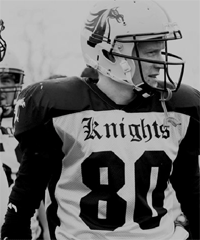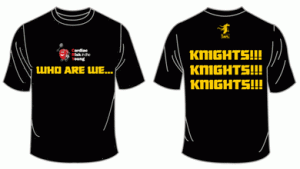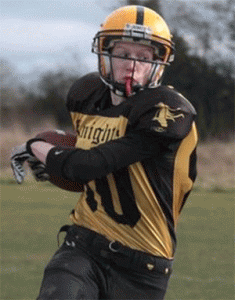Living with my condition supraventricular tachycardia, struggling with my head
Limerick Vikings American Football Team were always going to be a tough team to play and making the 5 hour coach journey to Limerick University was always going to be a disadvantage.
It was the 25th July 2009. I got off the coach after a 6am start and remember saying “I don’t feel good about this”. At the time I put it down to nerves, playing in the semi-final of the Shamrock Bowl.
It was in the 3rd Quarter when I was illegally hit square in the bac k after the whistle, that I was rendered unconscious. It took the Red Cross 15 minutes to carefully place me on a spinal board and lifted on to the ambulance.
k after the whistle, that I was rendered unconscious. It took the Red Cross 15 minutes to carefully place me on a spinal board and lifted on to the ambulance.
However, on the way over my team mate Matt Craig (ex-paramedic in the States) pointed out that I wasn’t breathing and then discovered I had no pulse. I was dropped immediately and CPR was performed sending emotional shockwaves through both teams.
I came in and out of consciousness and was immediately taken to hospital. I was accompanied by my parents and spent the next six days having a series of tests and scans; trying to get back on my feet and suffering from a series of panic attacks. I was then informed I had SVT (supraventricular tachycardia).
I wasn’t fazed that I had a health problem; I was, however, affected by the sudden limitations.
Everything initially became a struggle – walking long distances, even staying awake for long periods of time; and I suffered breathlessness and pains in my chest. I had gone from being a regular gym enthusiast, fit and healthy, an international athlete for Northern Ireland and Ireland, University Sports Scholar, first pick wide receiver in American Football for Carrickfergus Knights and had played for Team Ireland; to struggling to run the length of myself. Being both stubborn and determined, I decided to get back to being fit while waiting for heart surgery (ablation). I would get my fitness back up and get back on the pitch. Unfortunately I was cut short, as the League need confirmation that I was fit and healthy enough to play full contact – something that until after ablation was not advisable or possible.
I never really thought about being resuscitated or the extremity of the condition. However when it struck down a 16 year old GAA player, I started to get frustrated and depressed. My biggest struggle at the time was my own head. I resented being told I couldn’t do this or I wasn’t fit enough. I turned on team mates and found myself on the bench for my own safety – but not that I saw it that way. I became angry and constantly frustrated at the ‘concerned’ attitudes of others and the constant waiting for the ablation; all the while counting the young people in Northern Ireland who were losing their lives to Sudden Death Syndrome. Why did I have to live?
This was picked up by my friends and family and I needed focus. My housemate (who lost a friend a few years previous to Wolff-Parkinson-White syndrome) told me to get in touch with CRY and see if I could help raise awareness in Northern Ireland.
The Carrickfe rgus Knights where starting the 2010 season and decided to wear the CRY logo on our merchandise t-shirts (left) to raise support and awareness around the League as a reminder that even the fittest were vulnerable. I also started talking to people in CRY and reading accounts on the website and speaking to my local GP.
rgus Knights where starting the 2010 season and decided to wear the CRY logo on our merchandise t-shirts (left) to raise support and awareness around the League as a reminder that even the fittest were vulnerable. I also started talking to people in CRY and reading accounts on the website and speaking to my local GP.
On 9th July 2010 I spent 4 hours in surgery. Everything went according to plan and I started rebuilding my fitness.
Again, my issue was my head running over the procedure that I had been told about and read about; but I tried to not let my nerves get the best of me. I’d never had surgery before and my first time being heart surgery had me worrying. The best way I could deal with the worry and nerves was that I had the support of family and friends and I was in the hands of professionals.
Just recently I travelled back to Limerick University and played my first matc h after two years – on the same pitch against the same team (right). There was no Hollywood entrance; it was a hard fought game and at times I struggled both emotionally and mentally.
h after two years – on the same pitch against the same team (right). There was no Hollywood entrance; it was a hard fought game and at times I struggled both emotionally and mentally.
I was fearful and hesitant, but by the end of the match I had made it back on the pitch and scored the Knights’ only touchdown of the day. To some it was just a game, but for others and myself it was a positive step to getting back to normality and closure.
I struggled emotionally and mentally over two years and at times I really didn’t deal with it too well, if I even dealt with it at all. I still have a lot of unanswered questions and some frustrations, but in all I owe my life not only to the Red Cross and the Royal Hospital Cardiologists (Dr Roberts); but also the non-professionals – my family and friends, the Carrickfergus Knights and most of all my girlfriend at the time, Mel, who went through the daily motions and emotions and sat through seven hours of surgery and recovery. Words can’t express my heart-felt gratitude.
Gary McElkerney
Pictures supplied by Paula Shone and Ariane Boudias



